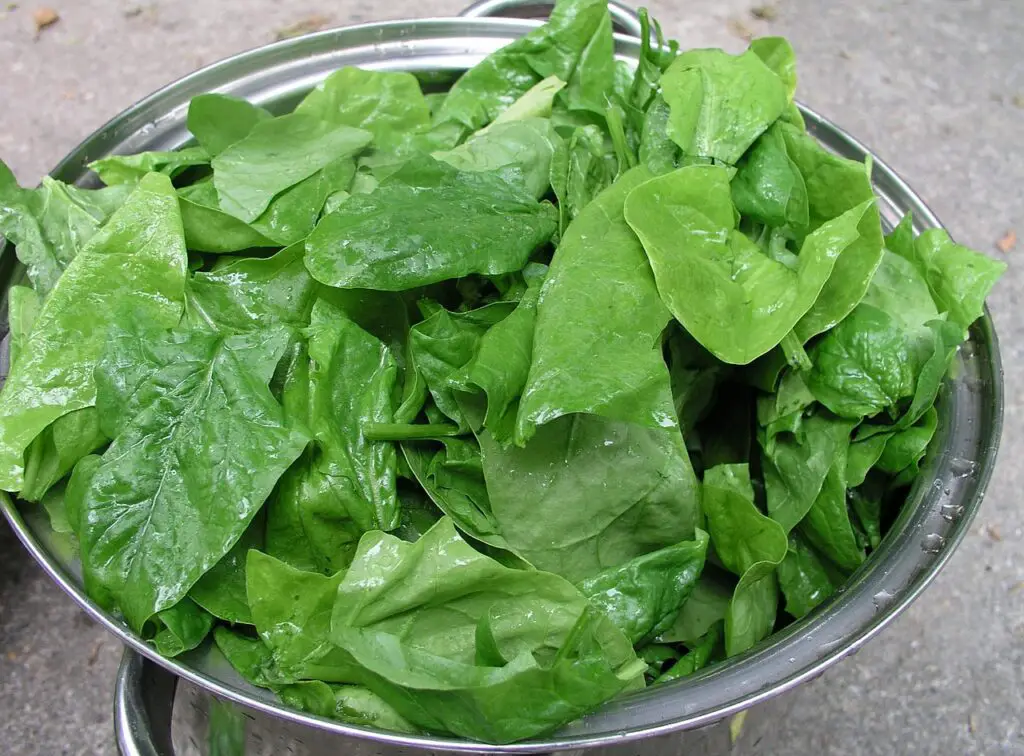If you are a dog owner who loves spinach, you may wonder if you can share this leafy green vegetable with your furry friend.
While spinach is generally considered a healthy food for humans, you may have concerns about whether it’s safe for dogs to eat.
In this article, we’ll explore whether cooked spinach is safe for canine consumption, its potential benefits and risks, and guidelines for incorporating it into your dog’s diet.
- Can Dogs Eat Spinach?
- How Much Spinach Can Dogs Eat?
- How Often Can Dogs Eat Spinach
- Health Benefits of Spinach To Dogs
- Potential Risks of Feeding Spinach To Dogs
- Nutritional Benefits of Spinach For Dogs
- Are Dogs Sensitive To Spinach?
- How To Prepare Spinach For Dogs
- How Fast Will Dogs Digest Spinach
- FAQs
- In Conclusion
Can Dogs Eat Spinach?

Yes, dogs can eat spinach in small amounts. Spinach is a leafy green vegetable that is packed with vitamins and minerals such as vitamins A, B, C, and K, iron, antioxidants, beta-carotene, and roughage.
While spinach is generally safe for dogs to eat, there are some things owners need to be aware of before serving this leafy green to pets.
Too much spinach can lead to kidney damage and stomach upset in dogs. It’s important to consult your veterinarian before adding spinach to your dog’s diet.
See also: 47 Safe Vegetables To Feed Your Dog. Puppy Power!
How Much Spinach Can Dogs Eat?

Dogs can eat spinach, but only in moderation. Spinach should not be the main source of your dog’s nutrition, and it should only be given as a treat or an occasional addition to their regular meals.
Typically, spinach should comprise no more than 10 percent of a dog’s diet.
It’s important to keep in mind that dogs have different daily caloric needs, depending on their age, size, and activity level.
As a general rule, a good guideline is to offer your dog no more than one to two cups of cooked spinach per week.
Of course, every dog is different, and it’s always best to consult with your veterinarian before giving your dog any new foods or treats.
Spinach Feeding Chart According To Size
| Food | Size | Portion |
|---|---|---|
| Spinach | Toy dogs | 1 cup |
| Spinach | Small dogs | 1 cup |
| Spinach | Medium dogs | 2 cups |
| Spinach | Large Dogs | 2 cups |
Spinach Feeding Chart According To Age
| Food | Age | Portion |
|---|---|---|
| Spinach | 0 – 6 months | Don’t feed |
| Spinach | 6 – 12 months | 1 cup |
| Spinach | 12 – 24 months | 2 cups |
| Spinach | 24+ months | 2 cups |
How Often Can Dogs Eat Spinach
As with any treat or supplement, moderation is key. While spinach is generally safe for dogs, it shouldn’t be a regular part of their diet.
It’s best to offer spinach to your dog no more than once or twice a week and in small amounts. One to two cups of cooked spinach per week should be sufficient for most dogs.
Keep in mind that some dogs may experience digestive issues like diarrhea or vomiting after consuming spinach, even in small amounts.
If your dog has a sensitive stomach or if you have any concerns about its diet or health, it’s always best to consult with your veterinarian before adding any new foods to its diet.
Health Benefits of Spinach To Dogs
- Rich in Vitamins and Minerals. Spinach is a nutrient-dense vegetable that contains a variety of vitamins and minerals that are beneficial for your dog’s health. Some of the vitamins found in spinach include vitamins A, C, and K, while minerals such as calcium, iron, and folate are also present.
- Supports Digestive Health. Spinach is a good source of dietary fiber, which can support healthy digestion in dogs. This fiber helps promote regularity and can reduce the likelihood of constipation or other digestive issues.
- Helps Strengthen the Immune System. The high vitamin and mineral content in spinach can help support your dog’s immune system. Vitamins like A and C have antioxidant properties that can help to protect cells against damage and may help prevent diseases.
- May Promote Good Vision. Spinach contains lutein, a compound that is important for maintaining good vision in both humans and dogs. Lutein helps to protect the eyes against damage from UV rays and other environmental toxins.
- Can Help Maintain Healthy Skin and Coat. Spinach is a source of essential fatty acids that are important for maintaining healthy skin and coat. These fatty acids help to keep your dog’s skin soft and supple while also reducing the risk of skin irritation or allergies.
Potential Risks of Feeding Spinach To Dogs
- Contains Oxalates. Spinach contains oxalates, which can inhibit calcium absorption and may contribute to the formation of kidney stones in some dogs. If your dog has a history of urinary tract issues or calcium oxalate stones, spinach should be avoided or restricted in its diet.
- Can Cause Digestive Upset. Some dogs may experience digestive issues such as vomiting or diarrhea after consuming spinach, particularly if they eat too much at once. This can be due to the high fiber content in spinach or the fact that dogs have difficulty digesting plant matter.
- May Interfere with Nutrient Absorption. Spinach contains phytic acid, which can interfere with the absorption of certain nutrients like calcium, iron, and zinc. Over time, this could lead to nutrient deficiencies in dogs.
- Can Contain Pesticide Residues. Spinach is among the crops that are most heavily treated with pesticides. While these residues are generally considered safe for human consumption, they can be harmful to dogs. When feeding spinach to your dog, it’s best to choose organic varieties and wash it thoroughly before serving.
- May Trigger Allergic Reactions. Like any new food, spinach can potentially trigger an allergic reaction in some dogs. Signs of an allergic reaction may include itching, swelling, or hives. If you notice these symptoms, discontinue feeding spinach to your dog and consult with your veterinarian.
Nutritional Benefits of Spinach For Dogs
| Spinach Nutrition Facts per 100 grams | % DV * |
|---|---|
| Calories | 23 |
| Total Fat | 0.4 g |
| Cholesterol | 0 mg |
| Sugar | 0.4 g |
| Glycemic Index | 15 |
| Sodium | 79 mg |
| Carbs | 3.6 g |
| Protein | 2.9 g |
| Vitamin D | 0% |
| Calcium | 9% |
| Iron | 15% |
| Potassium | 558 mg |
Are Dogs Sensitive To Spinach?
While spinach is generally safe for dogs to eat, some dogs may be sensitive to it. Symptoms of sensitivity to spinach can include:
- Digestive Upset – In some cases, dogs may experience digestive issues such as vomiting, diarrhea, or gas after eating spinach. This can be due to the high fiber content in spinach or the fact that dogs have difficulty digesting plant matter.
- Allergic Reactions – Like with any new food, dogs may have an allergic reaction to spinach. Signs of an allergic reaction include itching, swelling, hives, or difficulty breathing. It’s important to discontinue feeding spinach if your dog experiences any of these symptoms and seek veterinary attention.
- Kidney Issues – Spinach contains oxalates, which can contribute to the formation of kidney stones in some dogs. If your dog is prone to kidney issues or has a history of calcium oxalate stones, spinach should be avoided or restricted in its diet.
It’s important to monitor your dog’s reactions to any new food or treat, including spinach. If you notice any signs of sensitivity, it’s best to discontinue feeding spinach and consult with your veterinarian.
How To Prepare Spinach For Dogs
Cooked
Cooked spinach is a safe and healthy way to serve this leafy green to your dog. Simply chop or puree the spinach and add it to your dog’s regular meal. You can also mix spinach with other dog-friendly vegetables or animal-based proteins like chicken or beef to make a nutritious and flavorful meal.
Frozen
Frozen spinach is another great option for dogs, as it can be added to meals or used as a refreshing and nutritious treat. To prepare, simply freeze fresh spinach in an ice cube tray or use pre-packaged frozen spinach. You can then thaw the spinach cubes as needed and add them to your dog’s bowl or serve as a refreshing treat.
Fresh and Raw
Fresh and raw spinach can be a healthy addition to your dog’s diet, as long as it’s prepared properly. To prepare, simply wash and chop the spinach into small pieces and mix it with your dog’s regular food. It’s important to avoid overfeeding fresh spinach, as too much can cause digestive upset or other health issues.
How Fast Will Dogs Digest Spinach
Dogs typically digest spinach at a moderate rate. The exact speed at which dogs digest spinach can vary depending on factors like the dog’s size and overall health, as well as the specific form of spinach consumed (fresh, cooked, frozen, etc.).
In general, however, dogs have a shorter digestive tract than humans, which can mean that they process food more quickly. While it can take anywhere from a few hours to a day or more for a dog to fully digest spinach, most dogs should not have any issues digesting this leafy green when consumed in moderation.
If you notice that your dog has trouble digesting spinach or experiences any digestive upset, such as vomiting or diarrhea, after consuming it, it’s important to seek veterinary care right away.
FAQs
Can dogs eat spinach raw?
Yes, dogs can eat spinach raw. Spinach is packed with vitamins and minerals that are essential for your pup’s health. It is a great source of fiber and antioxidants, which helps to promote overall good health. When adding spinach to your dog’s diet, it is important to do so in moderation.
Can dogs eat spinach stems?
Yes, dogs can eat spinach stems in moderation. Spinach is an excellent source of vitamins A and K, as well as iron, calcium, magnesium, and potassium. However, due to the high fiber content in the stems, it is best to feed them sparingly.
Can dogs eat spinach dip?
No, dogs cannot eat spinach dip. Spinach is actually okay for dogs in small amounts, but the other ingredients like cream cheese and mayonnaise can be very bad for their digestive systems. There are also onions in spinach dip that could cause an upset stomach or even more serious health issues.
Can dogs eat spinach pasta?
Yes, dogs can eat spinach pasta. Pasta is a great source of carbohydrates for both humans and dogs. Adding some cooked spinach to your pup’s bowl of pasta can provide an extra boost of vitamins A, C, and K as well as iron and calcium.
Can dogs eat spinach tortillas?
Yes, dogs can eat spinach tortillas in moderation. While they may not be the healthiest snack for your pup, a few bites of a spinach tortilla as an occasional treat should not cause any harm. Be sure to check the ingredients list on the package and make sure there are no added sugars or seasonings that could be toxic to dogs.
In Conclusion
In conclusion, dogs can eat spinach in moderation, as long as it’s prepared properly and incorporated as part of a balanced diet.
Spinach can provide a variety of nutrients that may be beneficial to your dog’s health, such as vitamins and minerals, and can help support digestive health, strengthen the immune system, maintain healthy skin and coat, and even promote good vision.





Leave a Reply